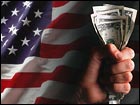What do consumers know anyway?
New study finds consumer confidence index could indicate the recession is over.
February 28, 2002: 5:37 a.m. ET
|
 NEW YORK (CNN/Money) - Though the Conference Board's consumer confidence index fell sharply in February, it's still well above historical levels and could indicate that the latest recession is already over, according to a research report published this week.
NEW YORK (CNN/Money) - Though the Conference Board's consumer confidence index fell sharply in February, it's still well above historical levels and could indicate that the latest recession is already over, according to a research report published this week.
Anthony Chan, chief economist with Banc One Investment Advisors, studied monthly changes in the closely watched index during economic expansions and recessions from 1977 to the present. He found that, while the index is more than 20 points below its level in March 2001, when the latest recession likely began, it is still nearly 50 points higher than its average level in the first months of other economic recoveries.
The index dipped to 94.1 in February, compared with 116.9 in March 2001. But the average index during the first months of the last five economic expansions was a much lower 42.5, Chan found.
"Recent trends in this index strongly suggest that the largely anticipated path towards economic recovery has in all likelihood already begun," Chan said in a research note released this week.
Chan also pointed out that the 116.9 reading in March far outpaced the average reading of 100.9 in the past four recessions.
"Consumer confidence warned us already that this would be mild recession," Chan told CNN/Money on Wednesday.
Chan also studied the "expectations" component of the confidence index - which fell steeply in February to 93.6 from January's 97.6 reading - and found that the gap between this recovery and others is slighter. In prior expansions, the expectations index averaged 85.6.
"It doesn't give support to a robust expansion," Chan said. "Expansion is coming, just not the garden-variety explosive economic expansion."
That view is consistent with that of Federal Reserve Chairman Alan Greenspan, who told Congress this week that rising unemployment, consumer debt and other factors could temper consumer spending in 2002 and slow down the recovery.
Greenspan and other economists note that business spending will also be a critical component of this recovery. But consumer spending is always important, making up $6 trillion of 2001's $9 trillion in U.S. gross domestic product (GDP), the broadest measure of economic strength.
To keep consumers spending, the Fed cut its target for short-term interest rates 11 times in 2001, and some economists have speculated that it would start to raise rates again by the middle of 2002. But Greenspan's comments and concerns about wavering consumer confidence have convinced Chan and other economists that the Fed will wait longer before tightening policy again.
Economists are divided about the timing and pace of the economy's recovery from its first recession in a decade, but a recent survey of 37 economists by the National Association of Business Economists found that many agreed with Chan that the recession may already be over. 
|
| SPECIAL: |
|
|
|
|
|

|

